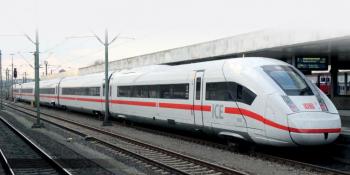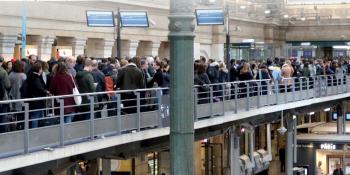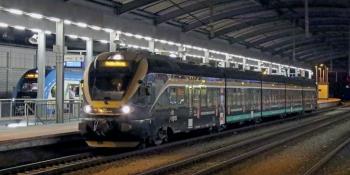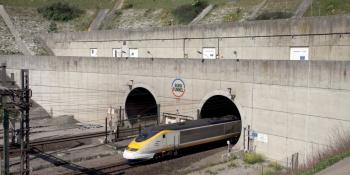EUROPE
ARRIVA SALE POSTPONED
As we suggested last month (p77), the planned trade sale of Arriva by German Railways (DB) was shelved in November as none of the offers made valued the company anywhere near its book value of €4 billion. Uncertainty caused by Brexit, Arriva’s UK pension liabilities (reportedly around £400 million) and the status of the Northern franchise in the UK all depressed the price bidders were willing to pay.
Following the decision of the DB board to halt the trade sale DB’s Chief Financial Officer Alexander Doll announced his resignation. Mr Doll had led and championed the sale and was blamed by his colleagues for not disclosing the various problems that occurred until it was too late. German Federal Transport Minister Andreas Scheuer reportedly intervened to ensure Mr Doll left DB; in contrast the trade union representatives on the management board publicly called for Mr Doll to remain in post.
DB confirmed to German media in early December that it intends to continue with its plans to sell Arriva in 2020 via a share sale on a stock exchange. DB plans to sell a minority stake in 2020; its remaining stake would be further reduced by additional sales over the next three years. It has previously been reported that any such share sale would be via the Amsterdam stock exchange.

AUSTRIA
COURTS THROW OUT LONG-TERM CONTRACT PLANS
In early October Austria’s main Federal Administrative Court rejected government plans to award national operator ÖBB 15-year contracts to operate long-distance and regional services. The Austrian Parliament had passed legislation allowing such contracts to be awarded by the Federal Ministry of Transport, Innovation and Technology (BMVIT) ahead of national elections in September. The decision was challenged by open access operator Westbahn, which argued that from December 2018 the award of direct award contracts longer than 10 years was prohibited under the EU Fourth Railway package (although they would have been permitted if awarded before that date). The court ruling confirmed that whilst direct award contracts are still permitted if concluded during 2019, and not outlawed completely until 2022, they cannot exceed 10 years.
Westbahn, in which French Railways (SNCF) recently increased its shareholding from 17.4% to 25.1% to gain a blocking minority position, is seeking to expand its business by winning contracts for regional services, although if services are not tendered this cannot be done. In December the BMVIT issued a one-year temporary contract for services in the east of Austria, pending a nine-year direct award. Westbahn again objected and pointed out that in neighbouring Germany the experience of tendering rail services had frequently reduced costs to the government by over 25%. Westbahn suggested the services be tendered and said it was ready to bid.
The Austrian Government considers only a limited number of long-distance routes to be commercially operated, these are:
■ Vienna to Salzburg;
■ Vienna to Hegyeshalom (Hungarian border);
■ Kufstein (German border) – Brenner (Italian border).
The rest, including Railjet/Nightjet long-distance trains, are covered by the national public service obligation and almost all are currently operated by ÖBB.
TRACK ACCESS CHARGE REFUND FOR WESTBAHN
In a separate court decision, again following a complaint from Westbahn, the Federal Administrative Court ruled in November that the Austrian rail regulator Schienen-Control had incorrectly approved track access charges that included an element of fixed costs as opposed to only assessing the marginal costs of running a train. The Court ruled national infrastructure manager ÖBB Infrastruktur will have to repay the train operators for the period 2011 to 2017, with estimates of the amount ranging from €500 million to €1.5 billion. Much of the refund will go to other train operating subsidiaries of ÖBB, although Westbahn is expected to receive around €50 million and private freight operators will also benefit.
This was Westbahn’s second successful legal challenge to the track access regime; in July, in a case that went all the way to the European Court of Justice, the judges ruled Westbahn should not be charged additional access fees for using stations as EU law required provision of stations and access to them as part of any basic track access package.
ÖBB TENDERS FOR EMUs AFTER BOMBARDIER DELAYS
In November ÖBB issued a ‘market investigation’ tender for three types of new 160-200km/h EMU, able to operate into neighbouring countries and potentially battery equipped for operation away from overhead electrification. Depending on responses ÖBB may launch a formal tender process.
This follows delays in delivery of new ‘Talent 3’ EMUs being built by Bombardier; so far none of 21 Class 4758 trains ordered for use in the western Vorarlberg region are in service, despite being due for delivery in June 2019. Bombardier agreed a framework contract for up to 300 ‘Talent 3’ trains in 2016 and one more firm order for 25x6-car trains has been placed for use in the Tyrol. These trains are due in service in 2020 but that currently appears improbable. It seems very unlikely ÖBB will take up any more of the options in its existing contract.
Bombardier’s problems are not confined to Austria. Multiple German operators have also had to find alternative arrangements as Bombardier has failed to deliver all the Talent 2s to Abellio as scheduled or any of the Talent 3 trains to SWEG or Vlexx in time for the December timetable change. In the case of some of the SWEG trains due in service in December 2019 on the newly electrified Riegel Malterdingen to Breisach Kaiserstuhlbahn, the current estimate for delivery from Bombardier is early 2021!

DENMARK
METROCITYRINGEN OPENS IN COPENHAGEN
The new 15.5km-long circular automatic metro ‘Metrocityringen’ opened in Copenhagen on 29 September. The new line, designated ‘M3’ has twin bore tunnels at an average depth of 30 metres below the surface and 17 stations. It had been under construction since 2011, after gaining parliamentary approval in 2007. It cost around DKK25 billion (£2.83 billion). Hitachi Rail Italy has supplied 28 Communications Based Train Control (CBTC) equipped, 39-metre-long 750V DC three-car EMUs which are similar to other trains used to operate existing lines M1 and M2.
The new line provides metro connections to the domestic and international services on the Danish rail network at Copenhagen main station (København H). Also linked to the new line are Østerport, served by ‘Oresund’ trains to Helsingør and Malmo, and the S-Tog suburban network.
The Cityringen line will be partly paid for by a surcharge on almost all passengers. This method of financing was agreed when the plans for the line and its legal basis were agreed between 2005 and 2007. A DKR1.60 (£0.18) supplement is charged per journey, capped at DKR80 (£9) a month for pay as you go type tickets. For season tickets a DKR80 monthly surcharge applies (although users can opt out of using the metro at all). The surcharge is not charged to users of single and day tickets (as it is effectively included in the fare) or to most concessionary fare passengers. Services operate 24 hours a day and up to 72 million passengers a year are expected to use the new line.

The Copenhagen metro system is relatively modern with the first line opening in 2002. As well as sections in tunnel some parts of the system are on the surface, in some cases using former rail alignments. Platform doors are used in underground stations with reduced height doors at surface stations.
NEW LINE M4 UNDER CONSTRUCTION
A 3km branch is currently under construction from the new Cityringen at Østerport which will serve Nordhavn and Orientkaj to the east; this will be operated as a shuttle branded line ‘M4’ from Copenhagen main station (København H) using the eastern part of the Cityringen from 2020. A 4.5km extension of the new M4 line currently being built through the Sydhavn district to Ny Ellebjerg, enabling interchange with services on the new high-speed line (p74, June issue), is expected to open by 2024.
FRANCE
DISPUTE OVER GARE DU NORD REBUILDING
In June 2015 then SNCF CEO Guillaume Pepy and the Mayor of Paris Anne Hidalgo shared a platform to present their plans to modernise and enhance France’s busiest station, Paris Gare du Nord, in time for the 2024 Olympics. At the time Paris was bidding for the Games, and it has since been confirmed as the venue. Some of the early work, such as renovated RER underground platforms, new catering facilities and an enlarged departure area for Eurostar, has been completed.
However, the rail operator and the city have now fallen out after plans for additional commercial development on the eastern side of the station, published in 2019, have provoked a backlash from residents and the city council, who object to the addition of a €600 million retail centre to be built in conjunction with Ceetrus (the property arm of supermarket group Auchan) on multiple levels above the existing suburban platforms. Concert halls and a rooftop garden plus parking space for 2,000 bikes are also part of the plan.
The principal objections appear to be driven by the scale of the proposed new development and the fact it appears to be led by the desire to create a major shopping mall rather than focused on the immediate needs of rail users, with the city saying it is ‘too commercial’ According to SNCF, the development helps pay for some of the station enhancements for passengers – and in any case by being above the platforms does not interfere with railway operation or passenger flows. The idea of co-locating major retail developments is not new as seen in multiple UK, German and Polish cities and at Paris St Lazare, but nothing on the scale planned has been built in France before.
In early October the National Commission for Commercial Development (CNAC) approved the SNCF plan for an extension to the station’s floor space by 16,321 square metres. Given the geographical limitations of the site and the fact the main train shed area is a listed monument, this can only be achieved by building above the eastern side of the station.
In mid-October at a planning advisory meeting SNCF and the city agreed to look again at the plans, but the continuing delays risk a half-finished station greeting visitors to the 2024 Olympics, not the gateway to Paris that the 2015 plans envisaged. SNCF and the city have agreed three architects will review the plans, with the city pushing for the scheme to be scaled back. A further public consultation exercise was planned for December 2019.
Ultimately SNCF will need to decide if it proceeds with the plan as currently approved (the city may object to it but cannot block it completely) or find a compromise solution with the Mayor that retains enough of the planned retail space to make the overall project viable. SNCF forecasts 260 million passengers will use Gare du Nord by 2024, rising to 300 million annually by 2030.

GERMANY
BILLIONS OF ADDITIONAL EUROS FOR DB
German Railways (DB) with the Federal Government launched a series of investment plans dubbed ‘starke Schiene’ (‘Strong Rail’) in June. This appeared to support the government’s plans to create a ‘Deutschland Takt’ regular interval timetable nationwide by 2030, which was announced in late 2018. However, with DB borrowing at record levels and notwithstanding potential cash from selling Arriva and possibly the DB Schenker logistics business, it was not obvious how the substantial investment in both trains and infrastructure required for ‘Deutschland Takt’ objectives like half-hourly ICEs between key city pairs would be found.
As part of the German Government’s wider ‘Climate Packet’ of measures the German railway industry – and somewhat controversially mainly DB itself – has in recent months become the recipient of substantial new funding. Between September and November, a series of announcements has significantly strengthened DB’s future finances (so much so that its Standard & Poors credit rating was increased to ‘AA’).
A capital injection (into holding company Deutsche Bahn AG) of €11 billion is planned in stages as a ‘capital increase’ over the next decade, providing DB with significant additional funds to invest in its train operating businesses. Tenders for more ICE trains and 400 bi-mode freight locos have already been issued.
In mid-November the budget committee of the German Parliament (Bundestag) agreed the biggest amount of new money with the new 10-year rail infrastructure budget, known as the Leistungs und Finanzierungsvereinbarung III (Performance and Financing Agreement III) or LuFV III planning framework, set at €86 billion. Government contributions will total €51.4 billion, with national rail infrastructure manager and DB subsidiary DB Netze responsible for most of the remaining investment. The amounts proposed under the new LuFV III framework – extended to 10 years – are nearly 40% higher annually than the previous five-year LuFV II which ran to 2019. Under the new arrangements government funding for infrastructure will be around €5.6 billion per annum in 2025-29; in 2019 it was around €3.5 billion.
Most of the new LuFV III funds are likely to be spent on a few existing major projects (such as Stuttgart 21, the Ulm – Wendlingen high-speed line and Karlsruhe to Basel quadrupling). The ‘new’ money will be used to improve the overall state of repair of the rail network and add capacity at congested junctions and pinch-points on the network to enable the introduction of the planned ‘Deutschland Takt’ regular interval timetable from 2030. After criticism from the Federal Court of Auditors about DB’s ability to control costs and spend money as agreed, DB’s access to the funds will be in tranches and funds from 2025 onwards may be withheld if agreed objectives and controls are not met.
The total amount of federal government funding is around €64 billion over the period 2020-29, of which around half is in addition to previous levels of funding. Not included are fees paid to train operators, including DB, to operate regional trains, which are funded via the 16 federal states; almost all the contracts are priced per train kilometre operated.
CONTROVERSY
The large increases in funding for the rail industry have been generally welcomed, but the fact they are being channelled through DB is not universally popular. Organisations representing DB’s competitors, both passenger and freight, have raised significant concerns with the government approach of making this investment in the rail industry through DB and legal challenges may occur. Opponents of the proposed capital increase for DB suggest it could be illegal under European law as it constitutes state aid to a state-owned company, and fear unfair cross-subsidy of freight and other services plus non-transparent prioritisation of investment to suit DB activities rather than the overall market.
VAT CUT POSTPONED
Separately, as part of the ‘Climate Packet’ a reduction in VAT charged on long-distance rail tickets (from 19% to 7%) is planned (shorter rail journeys already attracted the lower VAT rate), although it is currently being delayed (possibly until 2021) by parliamentary concerns about where the foregone tax will be found. A parallel increase in taxes on aviation should have the effect of reducing rail ticket prices at no cost to the train operator whilst stimulating demand.
DB’s long-distance business is the biggest beneficiary of the VAT cut, although Germany’s other long-distance rail operator FlixTrain will also benefit. Despite this, FlixTrain’s parent company FlixMobility is threatening legal action, saying the VAT cut will mean it has to reduce the fares on its FlixBus network and that some FlixBus routes will no longer be viable. Somewhat improbably, FlixMobility claims its (diesel) buses are nearly as environmentally friendly as its own electric long-distance trains.
GREECE
NATIONAL PASSENGER CONTRACT AWARDED
In early December it was announced the Greek Government had agreed a 10-year contract with the country’s sole passenger operator Trainose to operate services nationwide. The €750 million contract includes provision for a five-year extension. The Greek Government had previously announced its intention to award the contract in 2018 and had invited any operator interested in bidding to come forward; Trainose was the only operator to do so. The contract is structured to allow the withdrawal or addition of services over its duration; many regional routes in Greece lost all or most of their rail services following the financial crisis in 2009 and few services have been fully reinstated.
Italian state railway group Ferrovie dello Stato Italiane (FSI) bought Trainose in 2017 and during 2019 has trialled ex-Trenitalia Pendolino design EMUs transferred from Italy on the Athens to Thessaloniki main line, which opened as a rebuilt fully electrified route in 2019. The route opened using the new alignment between Tithoréa and Leianokládi on 20 May 2019 with journey times reduced by an hour, giving a best time between Athens and Thessaloniki of 3hr 57min.
As part of the new 10-year contract Trainose and FSI have committed to investments of between €2.2 and €2.5 billion over the first nine years, with five ‘new’ trains promised in 2020 and new bi-mode (electric/diesel) trains from 2022 onwards to replace older rolling stock. Investments in IT systems and maintenance facilities are also promised.

IRELAND
PELLETSTOWN STATION CONSTRUCTION UNDERWAY
Construction of a new commuter station at Pelletstown on the Dublin – Maynooth line was scheduled to commence during December. Located between Ashtown and Broombridge adjacent to the Royal Canal, the station was first proposed during the late 1990s and the Iarnród Éireann (IÉ) Dublin area integrated rail network plan 2002 listed it as being a priority. Planning permission was granted in October 2014, but IÉ’s financial troubles resulted in delays with funding.
The €10 million project will include a footbridge linking the existing Ashington Park development south of the line with Pelletstown. It is hoped the footbridge will reduce existing serious trespass issues in the area, with local residents currently crossing the track rather than using a 1km-long alternative walking route. The station will support new high-density residential development in the area and amenities on the Royal Canal including a new cycle path. Opening is scheduled for the third quarter of 2021. Tim Casterton
MIDLETON TO YOUGHAL TO BECOME CYCLEWAY
Shortly after the 10th anniversary celebration of the reopening of the branch line to Midleton (p82, October issue), Cork County Council (Cork CC) announced that the Irish Government had allocated €8 million towards the €15 million scheme to convert the remainder of the branch between Midleton and Youghal to a cycleway. Regular passenger services ceased in 1963 and the last train, a farewell special, left Youghal in 1985.
CIÉ (the Irish Transport holding company) has been negotiating a licence agreement with Cork CC to allow the conversion of the track bed, which passes responsibility for the maintenance and upkeep of the remaining infrastructure to Cork CC. In recent years the disused alignment has seen some adverse possession taking place, mainly by adjacent farmers, and responsibility for regaining possession of land back from those claiming it will also fall to Cork CC. Conversion of the 23km route is expected to take around 2½ years.
The licence agreement also includes a clause that if there is any future need for the railway to be brought back into use then the licence will terminate and the land will pass back into the ownership of CIÉ. Tim Casterton
POLAND
MODERUS GAMMA FOR ŁÓDŹ
Modertrans Poznań, a tram manufacturer owned by Poznań public transport company MPK Poznań, has been offering modernisation and refurbishment of older Konstal or Duewag-built vehicles for 13 years and in that time has rebuilt over 400 trams for multiple operators in Poland, rebranding them Moderus Alpha or Moderus Beta.
In 2016 the company launched its first new-build tram, a five-section prototype called the Moderus Gamma, and won an order from parent company MPK Poznań for 50 three-section versions (30 uni-directional and 20 bi-directional), which are currently being delivered.
The new Moderus Gamma has also been tested by operators in other Polish cities and in March 2018 Katowice-based Tramwaje Śląskie ordered 10 single-car Gamma trams for delivery by mid-2020.
In mid-November Łódź operator Łódź MZK ordered 30 five-section Gamma vehicles with Modertrans Poznań beating offers from fellow Polish manufacturer Bydgoszcz PESA and Stadler at its (ex-Solaris) factory in Środa near to Poznan. A bid from Turkish manufacturer Bozankaya was disqualified. The Łódź order is worth PLN268.5 million (£53 million). All the new trams are due to be delivered between March and September 2022.





